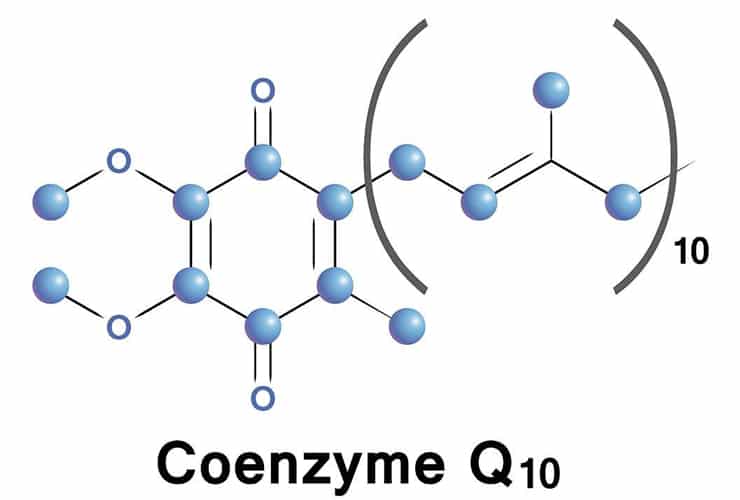Coenzyme Q10 is also known as ubidecarenone, and ubiquinone, and coenzyme Q is a co-enzyme, universally present in bacteria and animals. Q10 is the chemical label of the substance. The chemical composition seems to be Q10 becoming the quinone chemical group and 10 indicates the number of isoprenyl chemical subunits in the category.
What is CoQ10?
Coenzyme Q10 (CoQ10) is a constituent that is organically present in the human body, with the maximum levels in the pancreas, liver, kidney, and heart. People with specific diseases, like blood infections, gum diseases, high blood pressure, chest pain, Parkinson’s, migraine pain, HIV infections, and heart conditions are generally seen to have low coenzyme Q10 levels. It was first discovered in 1950. Coenzyme Q10 is best known to act as an anti-oxidant and provide energy to cells. In many Western countries, this is also sold and used as a dietary supplement for good heart conditions, controlled cholesterol levels, and blood impurities. it can also be processed and formulated in a laboratory. Coenzyme Q10 is a vitamin-like ingredient found in the body, but especially in organs like the pancreas, kidney, heart, and liver. It is consumed in trivial quantities in seafood and meats. it deficit symptoms are loss of appetite, nausea, pain in the upper abdomen, headaches, diarrhea, fatigue and low energy levels, and skin rashes. It also leads to major nutritional deficiencies with marked low levels of Vitamin B6, genetic challenges, mitochondrial, and oxidative stress syndromes, and tissue pains.
Coenzyme Q10 is a vital vitamin-like powder ingredient essential for the appropriate function of multiple organs and chemical rejoinders in the human body. It facilitates the offering of energy to human cells. it also seems to have antioxidant functions. Consuming it orally seems to act upon indications of coenzyme Q10 deficit. This is a very sporadic condition. The symptoms comprise seizures, laziness, fatigue, and weakness. In taking its powder by oral consumption seems to decrease indicators of mitochondrial ailments and syndromes. However, betterment in symptoms is sluggish. Some people have to take it for half a year to maximize benefits and improve health conditions.
In recent times medical research associates low blood levels of it with low levels of heart-protective good cholesterol which eventually may further upsurge the risk for heart conditions. Cholesterol-lowering elements may also lessen blood levels of it. it is not of any significance in diagnosing cancer, but it may diminish the hazard of heart damage instigated by one type of cancer chemotherapy medication.
Some Studies of CoQ10
A few detailed studies have observed the fact that whether it might facilitate to control of heart ailments and their outcomes are promising. A study on the impacts of CoQ10 on heart letdown is also unconvincing. However, there is an indication that it may diminish the threat of some hitches of a heart operation. The small amount of indication presently obtainable advises that it probably doesn’t have a significant impact on blood pressure. Although results of individual research have speckled, the global scientific indication does not facilitate the knowledge that it can lessen muscle aches due to the use of cholesterol-lowering medications labeled statins. A major National Institutes of Health-funded research displayed that it, even in higher-than-normal doses, didn’t recover signs in individuals with early Parkinson’s disease. A 2017 assessment of this study and numerous other, smaller studies decided that it is not useful for symptoms of Parkinson’s. Taking a specific medication containing coenzyme Q-10 powder comprising of omega-3 fatty acids or Phototropic and acetyl-L-carnitine orally seems to advance apparition in people with age-related vision challenges. Medical studies reveal that orally consuming coenzyme Q-10 powder improves neurological damage and nerve aches in patients with nerve injury caused by diabetic syndromes. Consuming coenzyme Q10 by mouth seems to function in immune activities in individuals with HIV/AIDS. Researches reveal coenzyme Q10 Powder can cut the occurrence of headaches by approximately 30% and the number of days with headache-related queasiness by roughly about 45% in adults. More than half of people using coenzyme Q10 in powder form face a 50% reduction in the number of head pain days every month. Coenzyme Q10 Powder has no impact on Alzheimer’s, Lou Gehrig’s disease, and post-polio syndromes.








